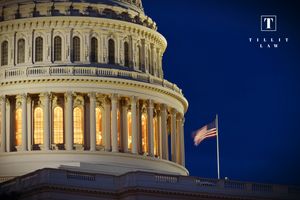The Federal Acquisition Regulation (FAR) prescribes the use of Limitation of Costs or Funds clauses in cost-reimbursable contracts that are either fully or incrementally funded. These clauses require contractors to follow specific procedures to notify the contracting officer (CO) when anticipated costs on a cost-reimbursable contract exceed a pre-determined threshold (typically 75 percent of the estimated costs), provide a revised estimate of costs for the remainder of the contract, and seek the CO’s approval to obtain additional funding. While FAR § 32.706-2 instructs the CO to insert the limitation of cost clause (LOCC) at FAR 52.232-20 in fully funded cost-reimbursable contracts, it instructs the CO to utilize the limitation of funds clause (LOFC) at FAR 52.232-22 in cost-reimbursable contracts that are incrementally funded.
These otherwise nearly identical clauses serve the dual purpose of protecting the contractor and the government from unfunded cost overruns. Firstly, the contractor is protected from the risk of the government’s unexpected refusal to pay additional costs due to the prior approval requirements imposed by the LOCC and the LOFC. Secondly, the LOCC and the LOFC protect the contractor by relieving any performance obligations on the contract beyond the stated cost limitation in the absence of the CO’s approval of a raised ceiling. Meanwhile, the clauses also protect the government by limiting the inherent risks of overpayments in cost-reimbursable contracts. That is, the LOCC and LOFC help prevent unnecessary cost overruns by requiring the contractor to go through an approval process to obtain additional funding before continuing performance on the contract beyond the contract’s stated cost ceiling. By setting a cost limitation ceiling, the government effectively protects itself from unexpectedly having to pay the contractor more than the anticipated costs set aside for the contract. The use of the LOCC or the LOFC also discourages contractors from utilizing unrealistically low pricing to obtain a competitive advantage during the solicitation stage of a cost-reimbursable contract.
However, despite the best intentions and efforts of the contractor, there may be situations where the contractor is unable to comply with the requirements imposed by the LOCC or the LOFC before incurring excess costs. In such situations, the government may invoke the contract’s LOCC or LOFC to preclude the contractor’s recovery of excess costs. However, the government’s invocation of the LOCC or LOFC in such situations is not an absolute bar to recovery of excess costs. Depending on the facts, contractors may file a claim for the excess costs incurred and expect recovery of those costs, provided their claim meets an exception to the applicability of the LOCC or the LOFC. These exceptions include:
- Situations where the contractor could not have reasonably foreseen the cost overrun during contract performance.
The contractor may recover excess costs when it can prove that the cost overrun was not reasonably foreseeable during contract performance. The contractor’s burden of proof regarding foreseeability carries with it an attendant duty to maintain an adequate accounting and financial reporting system to obtain timely knowledge of the possibility of cost overruns before costs are incurred. Additionally, the contractor is also responsible for properly evaluating the financial data generated by its accounting system. Therefore, a showing of a lack of foreseeability of cost overruns typically requires the contractor to demonstrate that it was impossible for the contractor to know the status of its actual costs. A typical example includes a scenario where the costs incurred by the contractor are dramatically increased in a short period of time due to no fault or knowledge of the contractor, such that it was impossible for the contractor to predict the cost overrun.
- Situations where the contractor could not have avoided the cost overrun through the stoppage of work.
The LOCC and the LOFC are not applicable in situations where the contractor does not possess a “meaningful decision” to avoid the incurrence of costs by stopping work on the contract. For instance, in situations where the contractor learns of the cost overrun after the completion of the contract, the contractor is not at fault for the overrun, the contractor had no reason to believe during contract performance that a cost overrun would occur, and the sole ground for the government’s refusal to fund the overrun is the contractor’s failure to give proper notice of the overrun – the LOCC and the LOFC do not apply. Such situations generally arise when there is a post-performance cost overrun that is not reasonably foreseeable during contract performance. Notably, if the contractor becomes aware of the potential of cost overruns during contract performance, it must notify the CO in compliance with the LOCC or LOFC of the contract, even if the cost overruns are likely to occur after performance on the contract is complete.
- Situations where the government was not prejudiced by lack of notice of the potential overrun.
In situations where the contractor fails to notify the government of a potential cost overrun pursuant to the LOCC or LOFC of the contract, the contractor may nevertheless recover excess costs if it proves that it was unlikely that the government would have directed the work to stop even if it had prior notice of the cost overrun. In other words, the government was not prejudiced by the lack of notice of the overrun because even if a notice had been given pursuant to the LOCC or the LOFC, the government was likely to order the contractor to continue performance under the contract. Such a situation may arise when the performance on the contract is near completion, the additional costs required to complete the contract are consistent with the spending trend on the contract, and the excess costs are relatively low compared to the total value of the contract. Notably, the government’s “eagerness” to continue performance alone is likely insufficient for the contractor to recover excess costs under this exception.
- Situations where the CO effectively exercised his discretion in favor of allowing overrun costs to the contractor.
Adjudicative forums have previously held that even though the CO is not required to fund a cost overrun when the requirements of the LOCC have not been met, it is still within the discretionary authority of the CO to allow the additional costs. Therefore, this exception typically applies in circumstances where the duly authorized CO has effectively approved the cost overrun funding in writing. Such situations may arise when the CO demonstrably requests additional funds from the agency in writing, specifically to pay the contractor’s invoice, or otherwise approves the contractor’s invoice in writing, but is unable to pay the contractor due to a shortage of funds. In such situations, the contractor can typically recover the approved excess costs even if the CO or another government official later attempts to invoke the LOCC or the LOFC to deny the contractor recovery.
- Situations where considering the totality of circumstances, it would be inequitable for the government to refuse additional funding.
Finally, contractors will be able to obtain recovery of excess costs even if they fail to meet the requirements of the LOCC or the LOFC if they can demonstrate that the balance of equities under the circumstances favors recovery of excess costs incurred. For instance, contractors have been relieved of the requirement of obtaining prior approval for an increase in the contractor’s cost limitation ceiling, where the contractor’s inability to determine its actual overhead, and therefore adequately foresee accrual of its indirect costs, was directly traceable to the government’s failure to conduct an audit. Therefore, the contractor may prove that it would be inequitable for the government to refuse additional funding if it can show that the cost overruns were at least partially attributable to the government’s failure to carry out its duties. Depending on the facts, contractors may also demonstrate that the equities are in their favor by providing evidence that tends to show that the government would obtain an unjust windfall in the absence of the contractor’s ability to recover excess costs.
- Situations where the government is solely responsible for expanding the scope of the contract in a contract involving “unidentified emergent work.”
In Reliability and Performance Technologies, LLC v. U.S. (No. 22-13), issued on May 23, 2024, the Court of Federal Claims (COFC) identified a potential new exception to the applicability of the LOFC in denying the government summary judgment in a situation where the contract at issue was not for specified work but involved “unidentified emergent work.” The COFC distinguished contracts involving unidentified emergent work from contracts where the contractor has all relevant information and control over the cost and schedule of completing specified work upfront. While such situations may naturally fall under the foreseeability exception described above, this case may nevertheless provide contractors with an avenue for recovery in a particular scenario where the government is in sole control of significantly expanding the scope of the contract by issuing modifications for previously unidentified emergent work, likely in contracts containing a LOFC as opposed to a LOCC. Notably, the contractor in this case also alleged that the government’s noncompliance with its obligations under the contract’s Allowable Cost and Payment clause caused a breach of contract. Specifically, the contractor alleged that the government breached the contract by not promptly negotiating final indirect rates, and by not adjusting the billing rates sufficiently, which led to a substantial underpayment to the contractor. By raising these government actions as violating the contract’s Allowable Cost and Payment clause, the contractor alleged that it was relieved from its obligations of obtaining prior approval under the contract’s LOFC clause. The Court likely also considered the allegations of the government’s non-compliance with the contract’s Allowable Cost and Payment clause as evidence tending to show that the balance of equities was in the contractor’s favor in this case, thus helping the contractor survive the government’s motion for summary judgment on the relevant counts.
The LOCC and the LOFC are prospective clauses, requiring the government and the contractor to determine their future course of dealing before exceeding the estimated costs ceiling. Therefore, to continue performance on the cost reimbursable contract containing a LOCC or LOFC, the contracting parties must again estimate and establish the amount of additional costs required to complete the contract before exceeding the previous estimated costs ceiling. The notice requirements of the clauses when seen in conjunction with the contractor’s ability to stop work in the absence of the CO’s approval to exceed the cost limitation, practically function as a catalyst to promote negotiations between the government and the contractor when the costs under the contract approach the pre-determined ceiling. Upon the receipt of a timely notice, the government can either choose to continue funding the contract, or at the written request of the contactor, terminate the contract for convenience. By understanding the requirements of the LOCC and LOFC, along with their exceptions, contractors can not only ensure contract compliance but also avoid risk of unfunded cost overruns.
This Federal Procurement Insight is provided as a general summary of the applicable law in the practice area and does not constitute legal advice. Contractors wishing to learn more are encouraged to consult the TILLIT LAW PLLC Client Portal or Contact Us to determine how the law would apply in a specific situation.





